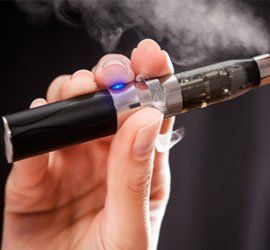ASCO/AACR Experts Advocate for E-Cigarette Regulations
Experts from ASCO and AACR have penned a statement for policymakers on the potential negative effects of e-cigarettes and other nicotine-deliveries electronics.
The rise of e-cigarette use has cancer experts worried

Concerned that the use of e-cigarettes and other nicotine-delivery systems are on the rise, experts from the American Society of Clinical Oncology (ASCO) and the American Association of Cancer Research (AACR) have penned a statement on the potential negative effects of these products. The statement is meant as a guide for policymakers. The report is published in the Journal of Clinical Oncology and in Clinical Cancer Research.
“We are concerned that e-cigarettes may encourage nonsmokers, particularly children, to start smoking and develop nicotine addiction. While e-cigarettes may reduce smoking rates and attendant adverse health risks, we will not know for sure until these products are researched and regulated,” said ASCO president Peter Paul Yu, MD, FACP in a statement. “The Food and Drug Administration (FDA) has signaled its willingness to regulate e-cigarettes and other electronic nicotine delivery systems, and we urge the agency to follow through on this intention.”
For patients trying to quit smoking, oncologists should recommend smoking cessation medications approved by the FDA rather than e-cigarettes, said the authors.
Tobacco is responsible for about 30% of all cancer deaths, according to the statement. It is estimated that 18 types of cancers are linked to tobacco use including lung, head and neck, and mouth cancers. E-cigarettes are often promoted as smoking cessation tools, but because e-cigarettes have not been well-studied, it is not clear how much nicotine and other chemicals are being ingested with their use and whether they actually promote smoking cessation.
The FDA Center for Tobacco Products currently regulates cigarettes, cigarette tobacco, roll-your-own tobacco, and smokeless tobacco, but does not regulate e-cigarettes. In April of 2014, the agency issued a proposal for a new rule that would extend its authority to cover e-cigarettes. The new rules would include the ability to market a tobacco product only after FDA review, allow the FDA to set requirements for health warnings, and allow companies to make claims of reduced risk only after scientific evidence has been confirmed by the FDA.
Some state governments have set age-restriction laws similar to those for traditional tobacco products. The ASCO and AACR statement is calling for the federal government to enact legislature that would restrict the sale, distribution, and marketing of e-cigarettes to minors.
“Although we call for additional research to determine with certainty the potential negative public health consequences of these products, particularly in youth, we cannot afford to wait to take prudent steps to stop those under 18 from using e-cigarettes,” said AACR president Carlos L. Arteaga, MD, director of the Center for Cancer Targeted Therapies and the Breast Cancer Program at the Vanderbilt-Ingram Cancer Center in Nashville, Tennessee. “This is especially important since e-cigarette use is growing fast among this age group, as reported in the most recent National Youth Tobacco Survey.”
The policy recommendations that the joint statement outlines include:
• The FDA Center for Tobacco Products should regulate all electronic nicotine delivery systems (ENDS) that meet the statutory definition of tobacco products. ENDS that do not meet the statutory definition of tobacco products should be regulated by the FDA through other appropriate authorities.
•ENDS manufacturers should be required to register with the FDA and report all product and ingredient listings, as well as the nicotine concentration in the ENDS solution.
•ENDS packaging and advertising should be required to carry safety labels that include a warning regarding nicotine addiction.
•All youth-oriented ENDS advertising and marketing should be prohibited.
•Funding generated through tobacco product taxes, including any potential taxes levied on ENDS, should be used to help support research on ENDS and other tobacco products, and should not preclude the allocation of federal funding for this research.